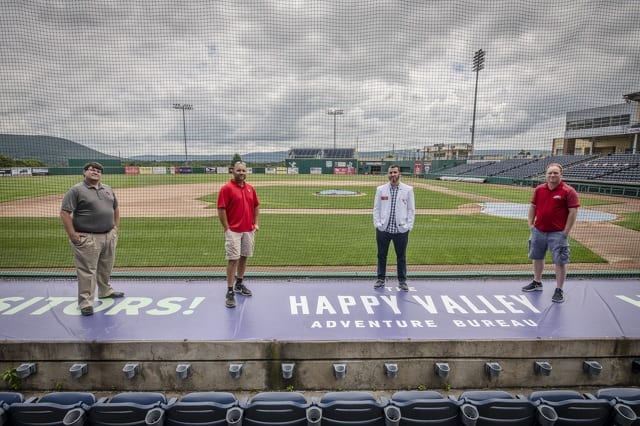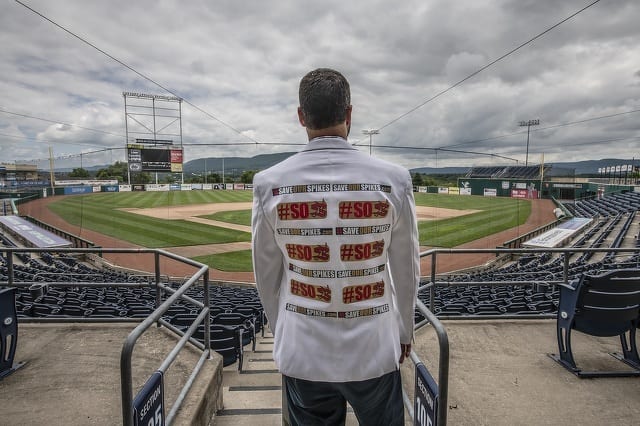It’s one thing to accept what COVID-19 has done to the game of professional baseball, drastically shortening the major league season and bringing an end to schedules of 160 minor league teams – including the State College Spikes – before they started in 2020. But it would be another concept entirely for loyal Spikes fans to comprehend no baseball in town in 2021 and beyond.
The Professional Baseball Agreement that regulates the working arrangement between the majors and minors will expire in October. With that looming, Major League Baseball in October 2019 included the Spikes, who are part of the St. Louis Cardinals system in the short-season Class A New York-Penn League, and 41 other mostly lower-level minor league teams within a contraction plan of about 25 percent of all minor league outlets.
Understandably, contraction – a politically correct word for extinction – spawned fear locally, but not necessarily a sense of panic. Once MLB’s “cut” list circulated publicly, the State College Spikes organization had no plans to accept those consequences of no longer being able to bring entertaining minor league baseball to central Pennsylvania.
Now, it appears that the Spikes have benefited from quick thinking and a little help – a lot of help, actually – from their friends.
A Save Our Spikes campaign was formed in conjunction with the Happy Valley Adventure Bureau and the Chamber of Business and Industry of Centre County. Local politicians such as Congressmen Fred Keller and Glenn Thompson became involved with the Save Minor League Baseball Congressional Task Force, and state Senate Majority Leader Jake Corman and state House Majority Leader Kerry Benninghoff also offered assistance. Pennsylvania Attorney General Josh Shapiro visited the ballpark, and Governor Tom Wolf also showed support, according to team General Manager Scott Walker.
In the interim, Joe Putnam, the Spikes’ manager of communications, said the team’s fan base distributed posters, magnets, wrist bands, and other promotional materials with the sole intent of convincing baseball’s brass that State College was more than worthy of professional baseball.
The right people heard the collective appeal, Walker said.
“Very good. Very good,” Walker said in early July about the chances of baseball returning to State College in 2021. “Yeah, it might not quite look the same as it has in the past, but we’re confident there will be professional baseball here in the future – next year and beyond.”
Walker said he was not at liberty to make public on whose authority that proclamation originated, but he stressed, “I’ve been told that.”
Baseball enthusiasts are disappointed not to be able to experience the glare of the lights, cracks of the bats, or the wafting, tempting aromas ranging from cinnamon-roasted nuts to popcorn to Italian sausages to juicy burgers sizzling on grills coming from the Spikes’ home base of Medlar Field at Lubrano Park on the Penn State campus. However, it does appear that the effort to save the team that plays in that $31 million stadium, which is only 14 years old, has been worthwhile.
And that effort was strictly local.
“It was all done here. It was all done by the Spikes; it was just us,” Walker said. “We needed, and still need to be, as appealing as possible to Major League Baseball to show them that we deserve to have an affiliated team here. And we’re still doing that.”
On top of community support, another aspect was to secure funding for some potential modifications that may have to be made to the ballpark under a new Professional Baseball Agreement.
“And we were having success,” Walker said. “There are much bigger things going on in this country right now; that has been put on pause. We were trying to show again to Major League Baseball how much this community cares and make sure that we were ready to be able to accomplish anything and everything that could be a part of a new agreement with Major League Baseball.”
Walker couldn’t detail specifics as far as what level of baseball might be played in State College if the endeavor to save the team continues on a successful path. The Cardinals have six minor-league teams, in Tennessee (Memphis, Johnson City), Illinois (Springfield, Peoria), Florida (Palm Beach), and, of course, Pennsylvania. Whether a new agreement retains the same number of classifications or whether all majors/minors affiliations stay intact remains to be seen, but the organization is striving to have people be able to watch baseball in State College.
“I can’t tell you exactly what it would be right now, but we’re very, very confident we will continue to have professional baseball here in the future,” Walker said. “What it looks like exactly is still to be determined.”
Putnam added that “there are lots of potential scenarios.” Walker said that a full season (April through Labor Day) of baseball isn’t out of the realm of possibility.
“We’d have to work with our great partners at Penn State University to figure out the logistics of that, but I’m confident we could,” Walker said.
Medlar Field is home to the Nittany Lions’ baseball team in the spring. The Spikes have been playing in a short-season league that runs from mid-June until early September.

Key members of the Spikes off-field team include (from left) Joe Putnam, communications manager; Matt Neri, senior sports turf manager; Walker; and Dan Petrazzolo, assistant general manager of operations. Photo by Darren Andrew Weimert.
A community resource
The atmosphere around a typical Spikes game transcends baseball. The team averages about 125,000 fans per year over the course of 38 home games. Aside from the varied food menu, a typical game night is a virtual playground for fans that can range from a “Cowboy Monkey Rodeo” to fireworks to between-innings, prize-winning contests. Just two seasons ago, the NYPL All-Star game was played in State College.
The team also raises hundreds of thousands of dollars for local charities, and no one wants to see any of the charitable efforts or aforementioned atmosphere be taken away. Especially people who have been with the Spikes as summertime employees from the beginning in 2006.
“The Spikes have been a great summer experience for the Centre County community, so we all miss it,” said Dave Baker, one of the team’s two official scorekeepers along with John Dixon. “I’ve been fortunate to work with great people in the Spikes’ front office staff in Jason Dambach, Scott Walker, and Joe Putnam, and then all of the game-day regulars like Steve Jones, Jeff Brown, Ang Montovino, and Bucky Quici for almost every Spikes season. We all share the hope that the Spikes will return in 2021 and that the entire community will once again enjoy baseball.”
Baker said that while summer may be a “slower time” in the State College community as many students leave campus and Penn State hits somewhat of a pause button, the fact that several thousand people watch each home game is a testament that the Spikes are an important part of the area’s summer scene.
“I’ve heard some reports of what might happen in the 2021 minor league baseball season and I hope those early reports will pan out and the Spikes will remain as an integral part of our summer,” Baker said.
The same with Gary Corman, an usher since the very beginning.
“Of course, it seems very odd not being at the stadium this summer,” Corman said. “I certainly will miss the contact with my fellow ushers, the Spikes staff, and also seeing the many friends I have made since I’ve been working there.
“Baseball needs to stay in State College. Many people look forward to this as part of their summer activity. I certainly hope that MLB takes a good, hard look at what they have in State College and the Spikes.”
Terree Michel, the Spikes’ head usher since 2006, praised the SaveOurSpikes.com campaign for getting the word out to the community.
“The Spikes are not just about baseball, but that is a big part of it. What I see is a great place to watch a baseball game, but also a great place to come together as a community,” Michel said.
“A lot of things happen at the ballpark that benefit our community – fundraising, bringing awareness to things that can help people, a place to go with your family and friends to gather and have fun. Baseball is an American pastime which dates back many, many years. We are very fortunate to have such a beautiful stadium here in State College, and the community really came out to support that and recognize the importance of having such a facility here to enjoy and to enjoy baseball,” she said.
Michel and Walker cited various stadium events such as Paint the Park Pink (breast cancer) and Alzheimer’s Awareness, First Responders Appreciation Night, and Coaches vs. Cancer events that raised not only public awareness, but funds for charity. The team raised more than $500,000 last year for local charities.
More recently, particularly with the pandemic forcing the season’s cancellation, the team held a Father’s Day Family Catch, and it hosted two separate viewing sites for the annual Fourth of July fireworks in State College. More public events are in the works, because the stadium is a community destination, according to Walker.
“We outlined a handful of very specific ways folks could help us,” he said. “Everybody was interested in doing something. We focused that energy and directed them to very specific ways to help us, such as purchasing tickets – a way to showcase your community as a prime destination for a team would be to show that you support it. And that means coming to the games, first and foremost. We were directing folks to purchase 15th-season commemorative merchandise. We’re encouraging folks to become a corporate partner.”
The bulk of 2020 – summer included, for sure – will go down as memorable because of the pandemic. Whether professional sports organizations will control their own destiny in 2021 … no one knows. What teams such as the Spikes can control now is attitude and perception, and they can hope for the best. And that means the return of baseball.
“We just thank the entire community for supporting us for so many years,” Walker said. “We look forward to that continuing. But certainly, we’re very cognizant of what’s going on in our country and in the world right now. We hope that everybody stays safe and healthy. And we thank everyone for their understanding and patience during these times as we kind of figure everything out as well. We wish the best for everyone in Happy Valley.”
Jim Carlson is a freelance writer in State College.



